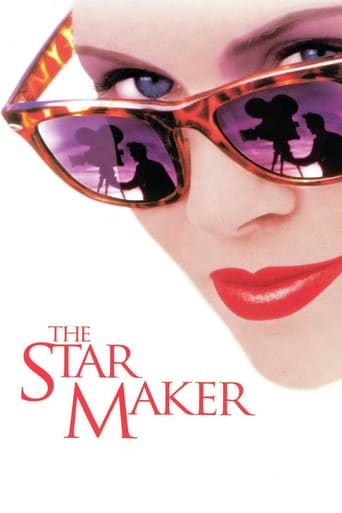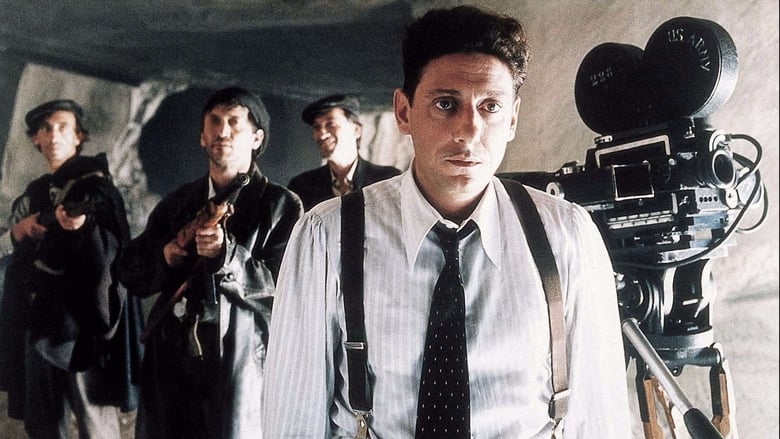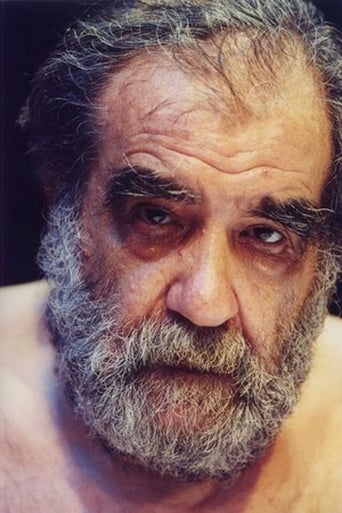

The Star Maker (1995)
The adventures and deceptions of a photographer who travels through small villages of 1950s Sicily pretending to work for the big film studios in Rome.
Watch Trailer
Cast
Reviews
Very Cool!!!
Pretty good movie overall. First half was nothing special but it got better as it went along.
A great movie, one of the best of this year. There was a bit of confusion at one point in the plot, but nothing serious.
Close shines in drama with strong language, adult themes.
This attractive Italian film featured an interesting story and some pretty women. It's a story about a man who dupes the natives (Sicilians, in this case) into thinking they could become movies stars after paying money to him to get a personal screen test. This turns out to be a pathetic comment about the unrealistic lure of fame and fortune.This film really looks good on widescreen DVD. It is gorgeous, just beautifully filmed, and I'm not just referring to the figures on the women.The dialog is a bit strange, at least to us over here in the States. I suppose this is considered a comedy but I saw it more as a drama. Yes, there are laughs, but it's pitiful how easily people are duped and what their values are. I found this an entertaining movie all the way through. With the nudity, it's not for kids (hence, the "R" rating.)
I love reading the comments by the I assume female writers who took time to critique this film. All universally saying the same thing, that the sex is either superfluous or if relevant demeaning to women. Of course its demeaning to women, it was intended to be. The guy is a rat bastard, thats what the film is all about. This film takes place a long time ago in a place that still would be considered backwards. I don't understand what people expect to see, but i assume its because they are fed a steady diet of Hollywood nonsense and have been for so long, that anything that isn't the false matriarchal utopia Hollywood longs for as a reality in life, upsets them greatly. Get over it already please. This film isn't any sort of great achievement, but it is sucessful in portraying rather accuratly conditions in post war Italy. Womens attitudes in Europe differ greatly than that of their American counterparts, and probably always will. They are as equally mystified by the total desexualization of our modern American society, as we are by their willingness to openly confront issues we deem taboo.
An Italian con man goes around all of Sicily, tricking people out of their money for a chance at stardom. I know from experience, this is something that happens every day. The main character is unsympathetic, and has very little depth until the end. The characters who confess their sins, their hopes, their dreams, their fears, in front of the camera are interesting, often emotional. However, the plot is missing, or at least weak. Also, the view of women portrayed in this movie is sexist, and I'm sorry to say, one that is common in Italy and Italian cinema that I've seen. Women are either virgins or whores. The "daughter of the Virgin Mary" shows herself to men for money, and says it's for love when she offers to give sexual favors to the main character. Another woman who gives payment with sex instead of money is treated degradingly. None of the sex in this movie is about love, it's all about giving sex to the main character to get something in return.I see some links to Cinema Paradiso, but overall, I can't believe this is by the same filmmaker.
After the sicilian-themed "Cinema Paradiso" and "Stanno Tutti Bene", Giuseppe Tornatore returns with another motion picture heaviliy imbued into sicilian themes and modern history. The vehicle he uses expose the audience of what Sicily is, is by showing the daily travails of an intinerant quack who claims to be a movie talent scout that collects fees from the gullible audience for the expenses of the film trials and proofs. This ploy reminds Fellini's "Il Bidone", in which a populace of northern Italy of the 1950's is shown through the experiences of a group of four swindlers. In front of the camera, the individuals recite stories that are spontaneous to them. It may be a family story. It may be something they memorized. And sometimes it is something that in normal circumstances they would never reveal, but here, in front of a camera and a chance to be seen by the Rossellinis and the De Sicas of Rome, in just two minutes of trial length, they literally confess their lifetime secrets and beings to the screening record. All sorts of characters are displayed: Male and Female, Young and Old, Straight and Gay, Talkers and Mutes, Carabiniere and Brigand, Humble and Cocky. The Man from Rome, after listening to days and days from his "clients", he concludes that the sicilian populace is an ignorant one, something that is echoed by the doctor to whom he gives a lift with his truck to a rural site where a farmer was dying. The scene of the doctor arriving in a hopeless medical situation is reminiscent of "Cristo Si e' Fermato a Eboli". Interestingly enough, in that film, the main character *is* a doctor, who is advised by the Priest "not to waste time with these ignorant people". Interesting parallels between these two films. Moving from town to town with his beat-up truck, transporting his wares, setting up a makeshift tent in public squares, announcing his arrival through loudspeakers, and collecting money from the audience, we see Sicily. And just like Zampano' in "La Strada" by Fellini, he teams up with a woman that ends up in a mental institution. We see all the sicilian characters: the Carabiniere may be like one in "Giorno della Civetta"; the Brigand may be like one in "Salvatore Giuliano", the Dongiovanni may be like one in "I Basilischi", and the indoor cafe crowds may be like the ones seen in "L'Avventura". Sicily is a state of mind. So many motion pictures have tried to portray it.While the stories in "Salvatore Giuliano", "I Basilischi", and "L'Avventura" were current to when these motion pictures were made (early sixties), more recently made motion pictures about Sicily retroactively show a "how it once was" attitute by showing a nostalgic remembrance of the populace and their lifestyles. "Kaos" (1984) by the Taviani brothers shows an antiquated Sicily, contrasted with their more current "Uomo da Bruciare" (1962). "Cinema Paradiso" is also a retrospective of since-gone lifestyles and relationships. And this nostalgic attitude on the past, as if the old days were better, is a trademark of Giuseppe Tornatore, exemplified in "Stanno Tutti Bene" in which a father is deceived by his children on their professional career status. Even in "Cinema Paradiso" we get the impression that movie-going was better in the old days. The modern age and machine age brought us a detachment from each other. In rural societies, people are used to talk to each other. So are craftmen working in small apprentice shops. But in this modern age, telephone operators working in cubicles are not allowed to socialize ("Stanno Tutti Bene"). And out of loneliness, one can even die ("Stanno Tutti Bene"). So the old days of the rural south were better because people socialized. And our itinerant equivalent of Zampano' is here to show us, the audience, who his audience is, this populace of 1950s Sicily is. This motion picture shows great outdoor scenery of stone towns in Sicily. Great street scapes. Great town squares. Great ambience of small crowds in piazzas, and indoor inside bars and cafes. There are also some beautiful detailed scenes shot in architecturaly-interesting spaces, indoors and outdoors. The camera is moved around to show the dynamism of people moving about in a hill town. Historically accurate, there are outdoor scenes showing political party flags and posters of the Democrazia Cristiana of the 1950's and the Comunist Party congregations in the countryside attempting to regain farmland (seen intensively in "Uomo da Bruciare"). But that is all I would reccomend seeing the movie for. Otherwise, I found the story weak, and the portrail of the characters silly, simplistic, and stupid. While in "I Basilischi" the characters are funny but intelligent, here we encounter people that we must assume are idiotic. The brigand, for example, is no Salvatore Giuliano. Even the kid that is asked to simulate orgasm is portrayed in a silly manner. With a large budget on filming a story about Sicily, I think here there was a wasted opportunity to make a potentially good movie, but lost its chance in silly portrail of its characters.


